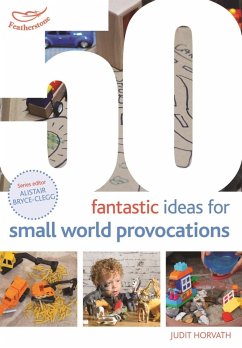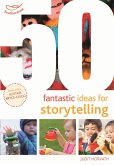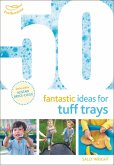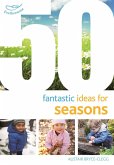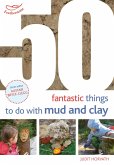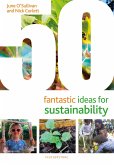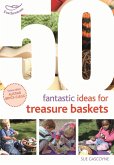_______________
The 50 Fantastic Ideas series is packed full of fun, original, skills-based activities for Early Years practitioners to use with children aged 0-5. Each activity features step-by-step guidance, a list of resources, and a detailed explanation of the skills children will learn. Creative, simple, and highly effective, this series is a must-have for every Early Years setting.
Small world play offers a wide range of learning opportunities for young children. Acting out narratives and ideas through the manipulation of small or miniature equipment, tools, toys and objects helps children to respond to their environment. Play becomes representative of real-life situations and is a medium through which children can explore their own feelings about these events and experiences in a safe and productive way. The frequent inclusion of sensory elements in this play also deepens experiences. Small world play is rich in possibilities for specific, thematic, learning, such as gathering information about spaces, positions, colours and cultures.
Small world play is entertaining, challenging, motivating and allows children to use their imaginations and decide on their own play choices. Many practitioners find it challenging to continually renew the play environment, but this book suggests ideas for how to ensure a meaningful play content that replicates environments or scenarios that children can connect to, using a large variety of resources from natural materials to specific props.
Presented in the accessible, practical and flexible 50 Fantastic Ideas format, Judit Horvath's book is a compendium of ideas that will ensure you get the most out of small world play in your setting, without over-stimulating and distracting the children involved.
The 50 Fantastic Ideas series is packed full of fun, original, skills-based activities for Early Years practitioners to use with children aged 0-5. Each activity features step-by-step guidance, a list of resources, and a detailed explanation of the skills children will learn. Creative, simple, and highly effective, this series is a must-have for every Early Years setting.
Small world play offers a wide range of learning opportunities for young children. Acting out narratives and ideas through the manipulation of small or miniature equipment, tools, toys and objects helps children to respond to their environment. Play becomes representative of real-life situations and is a medium through which children can explore their own feelings about these events and experiences in a safe and productive way. The frequent inclusion of sensory elements in this play also deepens experiences. Small world play is rich in possibilities for specific, thematic, learning, such as gathering information about spaces, positions, colours and cultures.
Small world play is entertaining, challenging, motivating and allows children to use their imaginations and decide on their own play choices. Many practitioners find it challenging to continually renew the play environment, but this book suggests ideas for how to ensure a meaningful play content that replicates environments or scenarios that children can connect to, using a large variety of resources from natural materials to specific props.
Presented in the accessible, practical and flexible 50 Fantastic Ideas format, Judit Horvath's book is a compendium of ideas that will ensure you get the most out of small world play in your setting, without over-stimulating and distracting the children involved.

